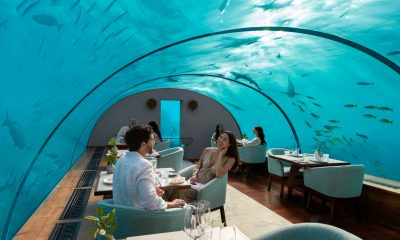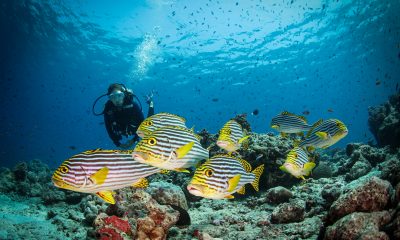Recommended
Hire your own private island paradise at Conrad Maldives Rangali Island
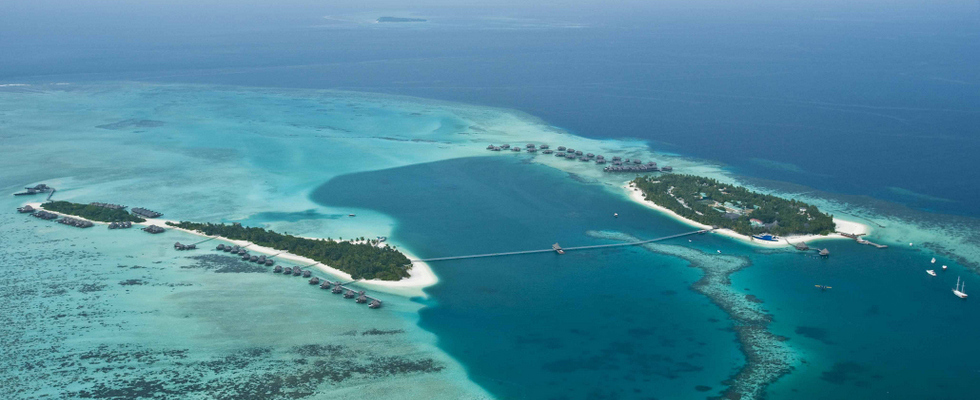
 Maldives.net.mv – For the ultimate in exclusivity and privacy, look no further than Conrad Maldives Rangali Island which is now available for private hire. Located in the South Ari Atoll and reached by a 30-minute seaplane flight, adult-only Rangali Island boasts 50 luxurious water villas, accommodating up to 100 guests. The island has three restaurants, an over-water spa, an infinity-edge pool and is fringed with sugary soft, white sandy beaches and crystal-clear aquamarine seas. Ideal for a no-expense sparred party or to live out island castaway dreams for an unforgettable holiday experience, Conrad Maldives Rangali Island really is the ultimate private island retreat.
Maldives.net.mv – For the ultimate in exclusivity and privacy, look no further than Conrad Maldives Rangali Island which is now available for private hire. Located in the South Ari Atoll and reached by a 30-minute seaplane flight, adult-only Rangali Island boasts 50 luxurious water villas, accommodating up to 100 guests. The island has three restaurants, an over-water spa, an infinity-edge pool and is fringed with sugary soft, white sandy beaches and crystal-clear aquamarine seas. Ideal for a no-expense sparred party or to live out island castaway dreams for an unforgettable holiday experience, Conrad Maldives Rangali Island really is the ultimate private island retreat.
A team of island experts will be on hand to go the extra mile throughout your stay to create magical memories that last a lifetime. From arranging a beach bonfire, cinema under the stars, desert island picnic or sunset fishing, nothing is too much trouble. And for the more restless members of your party, there are countless activities to keep them amused. From diving with manta rays, snorkelling with whale sharks, wakeboarding to beach volleyball tournaments, you needn’t sit still for a moment longer than you want to.
Despite its far-flung location, dining is also be a delight. Whether you want an unforgettable sunken beach dining experience, lobster and Champagne in a tranquil beach setting or a more formal dinner at the award-winning beachside Vilu Restaurant and Bar. For an intimate gathering, The Wine Cellar is a must. Located two metres underground and featuring a list of up to 20,000 bottles and 1,400 labels – the most in the Maldives, The Wine Cellar is the setting for degustation dinners for up to 12 people, hosted by the island’s head chef and chief sommelier, who skilfully match a five-course menu with up to eight hand-picked wines.
You and your guests will experience the height of understated luxury in your choice of 50 water villas, which all enjoy uninterrupted views over the Indian Ocean with their own private Jacuzzi or plunge pool and stairs leading directly into the water. For the ultimate treat, there are two Sunset Water Villas situated in their own lagoon with a glass floored living room, circular rotating bed, private infinity pool and only accessible by speedboat and private walkway.
Rangali Island: Exclusively Yours – prices start from $470,000 for a four night stay. Price includes 50 water villas for four nights, all meals and taxes. Subject to availability.
Action
Freediving with tiger sharks: Shark Expedition Fuvahmulah collaborates with marine biologist Andriana Fragola

Shark Expedition Fuvahmulah, renowned for its world-class scuba diving encounters, has announced an exciting expansion: the chance to freedive with tiger sharks in the Maldives’ southernmost atoll.
Fuvahmulah, often hailed as the “Tiger Shark Capital of the World,” is the only place on the planet where year-round encounters with tiger sharks are virtually guaranteed. With more than 280 identified resident tiger sharks, the island has become a bucket-list destination for divers and marine enthusiasts alike.
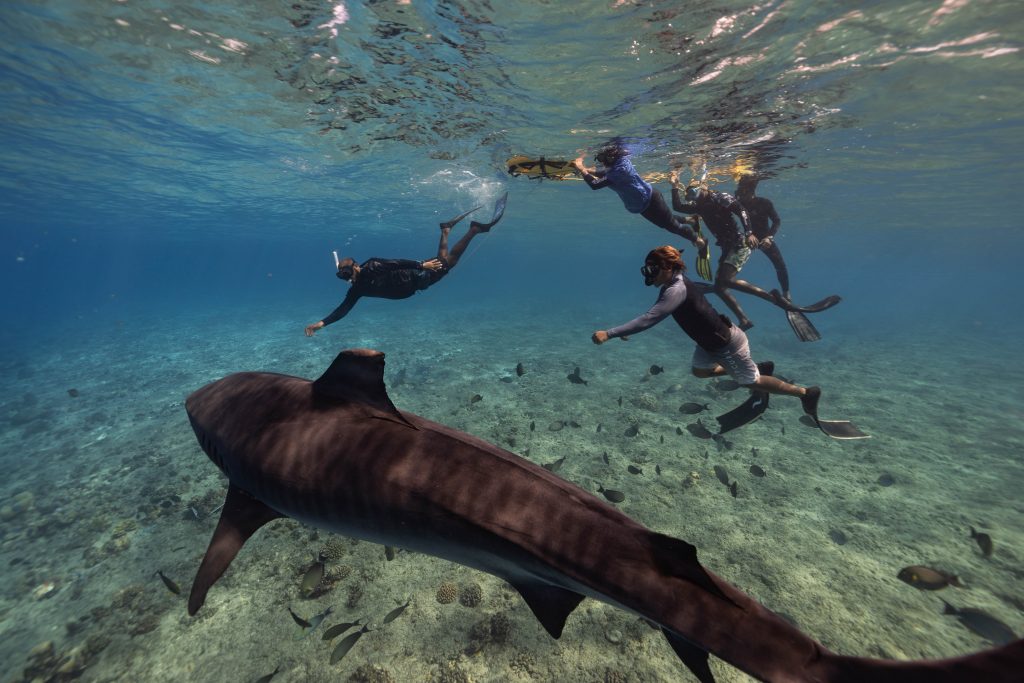
The newly introduced freediving experience offers a unique way to interact with these apex predators. Unlike scuba diving, freediving takes place without bubbles or heavy gear, allowing participants to connect with tiger sharks in a quieter, more natural way. This approach often makes the encounter more comfortable for the sharks and more intimate for the diver.
Guiding these expeditions is Andriana “Andy” Fragola, a marine biologist, shark diver, and conservationist currently based in Hawaii. Andy holds a Master’s Degree in Marine Conservation Biology with a focus on shark microbiology and has dedicated her career to shark research, conservation, and public education. Through her work in media and content creation, she strives to raise awareness about the importance of shark conservation and inspire people to take action to protect marine ecosystems.
“Freediving with tiger sharks is a raw and transformative experience,” says Andy. “Being eye-to-eye with these incredible animals without the barrier of scuba gear allows you to see them for what they truly are—powerful, intelligent, and essential to the health of our oceans.”
Shark Expedition Fuvahmulah ensures that all freediving activities are conducted under strict safety protocols. With experienced professionals like Andy leading the dives, participants can expect both an exhilarating and responsible adventure.
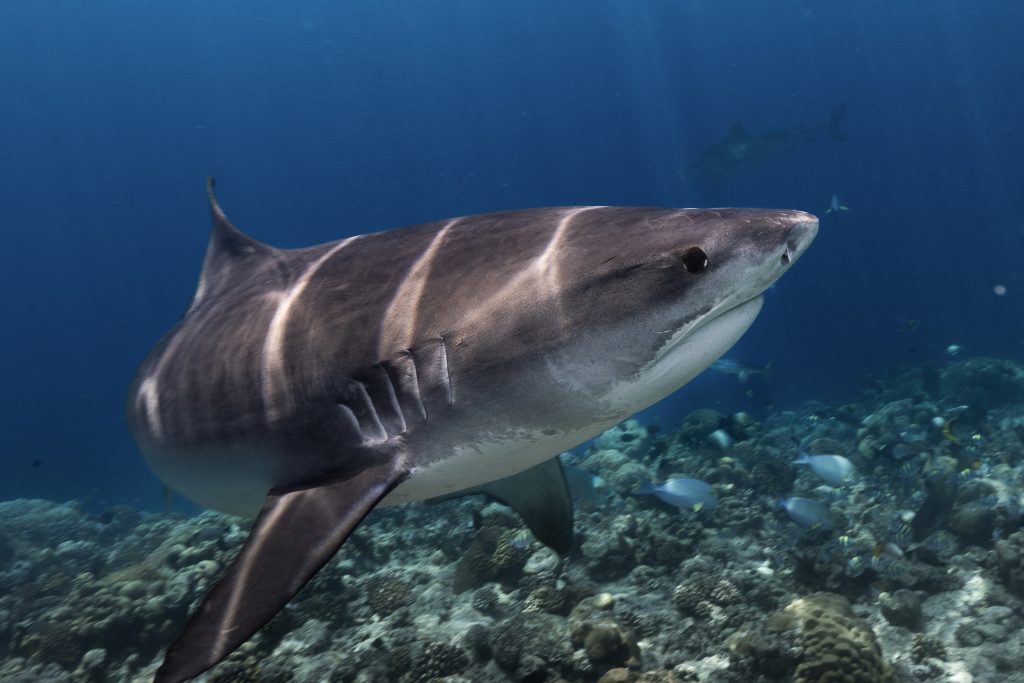
Why this experience stands out:
- Eye-to-eye encounters with tiger sharks in their natural habitat.
- A deeper, more personal connection with marine life.
- Expert-led guidance ensuring safety and conservation awareness.
In addition to freediving, Shark Expedition Fuvahmulah offers a range of packages, including accommodation options, making it easier for adventurers to fully immerse themselves in the island’s extraordinary marine environment.
For bookings and more information:
📧 Email: sales@scuba-expeditions.com
📱 WhatsApp: +960 9894653
🌐 www.scuba-expeditions.com
Culture
Palace for the prince: Muleeage’s century-long journey through history

It was ‘honeymoon season’ in Suez. Sultan Haji Imadudeen was reigning on a throne of love in Egypt. But back home, those were darker times, as Maldives continued to borrow from Bohra merchants of Mumbai. After all, the wedding expenses of the monarch had to be paid by the state.
Imadudeen has appointed his younger brother, Dhoshee Manippulhu of Maandhooge, as the regent to take care of the state’s affairs, but it was Prince Ibrahim Dhoshimeynakilegefaan of Athireege who ruled. Prince Ibrahim’s son, Abdul Majeed Didi of Athireege, took charge of stabilising the nation.
Backed by the British masters and business elites in Male’, Abdul Majeed Didi began hatching a secret plan. Finally, by the early hours of March 10, 1910, onlookers could understand that something was happening in Muleege. Beeru Mohamed Fulhu, who was at the Friday Mosque, saw the door being opened and Mohamed Shamsudeen being escorted out by his brother-in-law Abdul Majeed Didi and Sayyid Kilegefaanu, also known as Khatheeb Seedhi. The two men accompanied Shamshudeen to Boduganduvaru, the royal palace, and placed him on the throne as Sultan Shamsudeen Iskandhar, Al-Salitc. As Shamsudeen was the brother-in-law of both men, the aim behind the plan could mean more than just stabilising the nation; there might have been personal motives and interests.
After appointing Shamsudeen the sultan, Khatheeb Seedhi told him that no one was ever going to challenge his reign. He said that Shamshudeen was not going to leave the throne unless he wished to do so.
Khatheeb Sidi’s saying became true, as Shamsudeen remained in power for the next 31 years, six months and 28 days. That was until he left behind all the privileges of a king for the sake of his beloved son Hassan Izzuddeen, for whom he built Henveyru Ganduvaru or Muleeage from where he started his journey to become the sultan at one midnight. As the famous public speaker and poet Ibrahim Shihab later said, the sultan abdicated for the only son he ever had.
Muleeage, the presidential palace which is now 105 years old, was originally built for Shamsudeen’s son and the then Crown Prince Hassan Izzudeen. The palace was originally named as Henveyru Ganduvaru. It was a symbol of the king’s love for his son.
The origin of this address goes back to the era of the heroic Sultan Hassan Izzudeen, also known as Dhonbandaarain. This plot of land was first used to build a thatch hut when Muhammad Manik of Mulee shifted his family to the capital city. The house was later inherited by Dhonbandaarain and then by Ibrahim Noorahdeen and then by his son Shamsudeen. Hassan Izzudeen was born to Shamsudeen and Sithi Didi, daughter of Bodu Sidi of Kalhuhurage.
When Izzudeen was studying in Ceylon, Shamsudeen decided to build the house before his son returned home. Shamsudeen decided to build it as a palace for the crown prince.
Fully funded by state coffers, the project was commissioned in 1914. Ahmed Dhoshimeyna Kiligefaanu of Athireege was assigned as the project manager. Architects and builders were brought from Ceylon. Architecture and the design was that of the Victorian era with a touch of colonial architectural design. Furniture too was imported from Ceylon. Few transoms were designed by Easa Mohamed Fulhu from the island of Kela in Haa Alif Atoll.
The palace was opened on December 7, 1919, with a special Mauloodh, a cultural prayer.
Izzudeen came back from Ceylon after his education to live in the palace as “Henveyru Ganduvaru Manippulhu”. He lived with privileges that don’t match with that of any other prince. As he was a highly-skilled musician, the palace became a theatre for music. Izzudeen sang with his beautiful voice whilst also playing harmonium. Boys of his dance group, widely known as “Nashaa Party” danced to his music, dressed as ladies. Boduberu too was part of the fun at the palace. It was full on partying till midnight on most days. It is said that the novel, Dhonthuhkalaage Gellunu Furaavaru (lost teenage of Dhonthuhkala), written by Muhammad Ismail Didi of Meerubahuruge, was based on an incident that happened at the palace.
The elite of Athireege took all that as inappropriate for a crown prince. Their disapproval grew and Izzudeen was considered as someone who is ineligible for the throne. The first written constitution in the history of Maldives was passed as a result. It was written in that constitution that the sultanate will only go to a grandson of Dhonbandarain, effectively removing Izzudeen from the royal inheritance path.
But the constitution was later received by the people as a burden, as new laws were introduced to a population that was not aware of such rules. It made their life miserable.
“We can’t bear this anymore,” they said, as they gathered at the Gulhakulhey Fasgandu, an open area just next to the headquarters of the army, and tore apart the document. They even attempted to bring out some ministers to be dealt with by the mob.
The country then saw increased hostile actions against the government from Izzudeen who tried to take over.
Prime Minister Hassan Fareed issued orders to arrest Izzudeen’s allies. Izzudeen went to Bodubandeyrige, then headquarters of security forces, in person to try save his allies. Shamsudeen left the throne to follow.
The prime minister, who was paving way for the change in government, used this as an opportunity to overthrow Shamsudeen. The latter was banished to Fuvahmulah, in the far south, together with his son Izzudeen.
Izzudeen died on the island after a short ailment, whilst Shamsudeen was brought back to Male’ as his health deteriorated. He died shortly thereafter. Henveyru Ganduvaru was deserted after that.
All the palaces except that of the sultan were later downgraded and Henveyru Ganduvaru became Muleeage, taking the name of the first house built at the address.
Muleeage was used for several purposes for the next 80 years before becoming the presidential palace in 1953. From 1942 to 1947, it was used to house the ministries of home affairs and defence, and the office of the head of intelligence. It also served as the headquarters of the first newspaper in the country, Sarukaaruge Khabaru.
With the first republic that came into being in 1953, Muleeage became the presidential palace, serving as the official residence of Mohamed Ameen Didi, the first president.
As the monarchy was reinstated after overthrowing Ameen and abolishing the republic in a coup, Muleeage became the office of the prime minister. Ibrahim Famuladeyrikiligefaan and Ibrahim Nasir were prime ministers who used the office. At one point during their administrations, Muleeage also housed the ministry of defence.
Presidential palace and several ministries at some point, Muleeage has been in use ever since.
Apart from this, several high profile guests of the state stayed there during their visits. Late Queen Elizabeth and her late husband, The Duke of Edinburgh Prince Philips were amongst those.
Although Ibrahim Nasir, as the first president of the second republic, declared Muleeage as the presidential palace again in 1970, he didn’t use it as such. His successor, Maumoon Abdul Gayoom, was the first president to formally use it as his official residence. He stayed there from 1988 to 1994, before moving to Theemuge, a newly built presidential palace which later became the Supreme Court.
The first Supreme Court, which was the result of the present day constitution, was temporarily housed in Muleeage in 2008. Then came President Mohamed Nasheed who chose to make it the presidential palace yet again. It was also used as the offices of a national inquiry commission, which was setup to investigate the events surrounding Nasheed’s early departure in 2012, before becoming the presidential palace again.
In the century that has passed since Muleeage was built in its current design, it has witnessed numerous historical events in the country. It witnessed the declaration of the first republic and the reinstating of the monarchy. It hosted heads of states as well as ministers from different parts of the world. Indian Prime Minister Rajiv Gandi was one amongst them to be remembered.
Been a place for all that, the status of Muleeage is much more important in our history; it was the childhood home of Hassan Izzudeen, Dhonbandaarain, the heroic sultan who freed Maldives from the short-lived rule of the Malabari invaders, also known as “Holhin”. This was the place from where he came out for his battle with the flag of freedom flying over his head.
Action
Utheemu Ganduvaru: Portal to Maldives’ national freedom

The Maldives, often celebrated for its sun-kissed beaches and turquoise waters, also offers a rich tapestry of history and culture waiting to be explored. Among the islands of Haa Alif Atoll lies Utheemu Island, home to Utheemu Ganduvaru, a historical treasure that invites travellers to delve into the storied past of the archipelago.
Utheemu Ganduvaru, the ancestral home of Muhammad Thakurufaanu, stands as a poignant reminder of the Maldives’ fight for independence. Thakurufaanu, revered as a national hero, led a successful campaign against Portuguese occupation in the 16th century. His childhood home, Utheemu Ganduvaru, offers a rare glimpse into the life and times of this legendary figure.
In 1558, the Portuguese invaded the Maldives, killing the Sultan in battle and establishing their rule. Muhammad Thakurufaanu and his brothers, Ali and Hassan, left for Minicoy to prepare a campaign to liberate their country. The boat they built, Kalhuohfummi, was crucial to their efforts. Thakurufaanu and his brothers fought the Portuguese for eight years, landing on different islands under cover of night to evade capture, and departing before daybreak. Eventually, they landed in Malé and defeated the Portuguese leadership in the capital. Freed from Portuguese rule, the people chose Muhammad Thakurufaanu as their Sultan.
Sultan Muhammad Thakurufaanu ruled the Maldives for 12 years until his death in 1585. He is remembered as a considerate and just ruler, concerned for the well-being of even the poorest citizens. He is also credited with establishing the country’s first formal military unit.

Back at Utheemu Island, visitors are immediately struck by the island’s tranquil beauty and its lush, green landscape. The journey to Utheemu Ganduvaru is a step back in time, where the echoes of history are palpable. The residence itself, a traditional wooden palace, is meticulously preserved, showcasing the architectural ingenuity and cultural richness of the period.
As you enter Utheemu Ganduvaru, the simplicity and elegance of the structure are apparent. Built from timber, the palace is a fine example of traditional Maldivian craftsmanship. The intricate woodwork, with its detailed carvings and polished surfaces, speaks volumes about the artisanship that flourished during Thakurufaanu’s time.

The main hall, with its open layout and cool, shaded interiors, offers a sense of serenity and reflection. It was within these walls that Thakurufaanu spent his formative years, and each room tells a story of his early life and the influences that shaped his destiny. The residence includes living quarters and storage spaces, all arranged in a manner that reflects the daily life of a prominent Maldivian family in the 16th century.
One of the most compelling aspects of Utheemu Ganduvaru is its connection to the larger narrative of Maldivian resistance against foreign rule. Guides at the site often recount tales of Thakurufaanu’s daring exploits and strategic brilliance. His knowledge of the archipelago’s intricate waterways and his leadership in naval battles are celebrated as key factors in the successful expulsion of the Portuguese in 1573.


Beyond its historical significance, Utheemu Ganduvaru offers visitors a deeper understanding of Maldivian culture and heritage. The site is a testament to the resilience and unity of the Maldivian people, embodying values that continue to inspire. For travellers, a visit to Utheemu Ganduvaru is an opportunity to connect with the soul of the Maldives, experiencing the essence of its history and the spirit of its people.
While on Utheemu Island, visitors can explore other points of interest, such as the island’s beaches and vibrant local community. Engaging with the locals offers additional insights into Maldivian traditions and hospitality, enriching the overall experience.
For those seeking a journey through time, Utheemu Ganduvaru in Haa Alif Atoll is a destination that should not be missed. It is a place where the past comes alive, where the legacy of a hero continues to resonate, and where the true essence of the Maldives can be discovered. As you walk through the halls of Utheemu Ganduvaru, you are not just a visitor; you are a part of a historical journey that defines the Maldivian identity.
So, when planning your next visit to the Maldives, venture beyond the beaches and dive into the rich history of these islands. Let Utheemu Ganduvaru be the highlight of your cultural exploration, offering a meaningful and memorable connection to the heart of Maldivian heritage.
Cover photo: Andreas Faessler
-
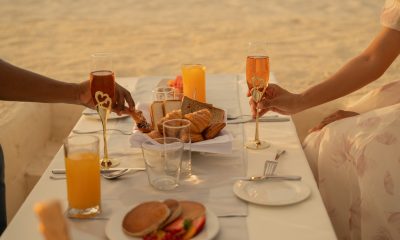
 Cooking1 week ago
Cooking1 week agoFrom shoreline to hotpot: New dining experiences at Sun Siyam Iru Veli
-
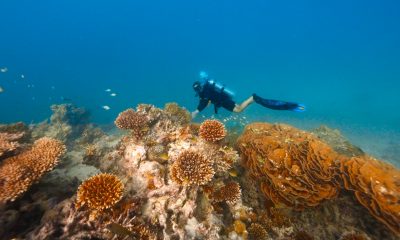
 News1 week ago
News1 week agoVentive Hospitality aligns Maldives portfolio with Green Fins marine sustainability platform
-
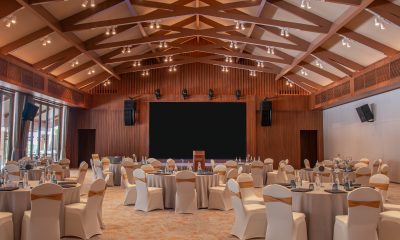
 Business1 week ago
Business1 week agoFeydhoo Hall opens at dusitD2 Feydhoo Maldives as new event space
-

 News7 days ago
News7 days agoThe Ritz-Carlton Maldives, Fari Islands launches conservation programme for environmental observances
-

 Drink1 week ago
Drink1 week agoProvence comes to Maldives with Château Minuty dinner at Milaidhoo Maldives
-
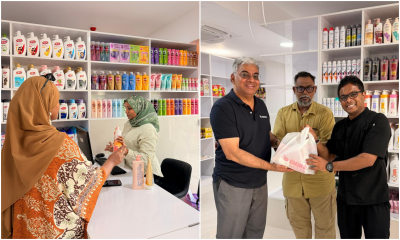
 Business1 week ago
Business1 week agoBBM expands retail presence with new Hulhumalé outlet
-
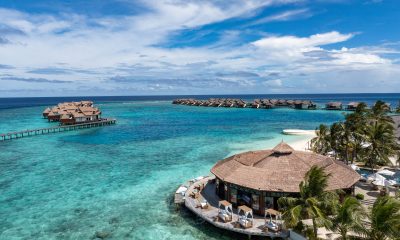
 Awards1 week ago
Awards1 week agoDouble gold win for OZEN RESERVE BOLIFUSHI and OZEN LIFE MAADHOO at Junior Travel Awards
-
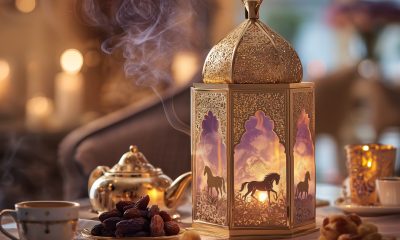
 Featured1 week ago
Featured1 week agoCity Iftar experience curated at JEN Maldives by Shangri-La






